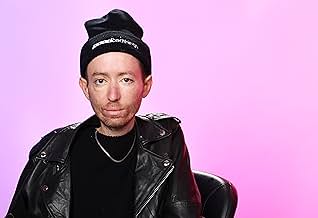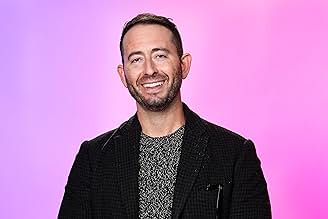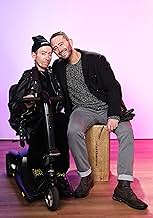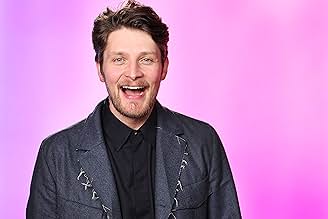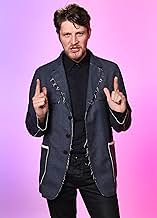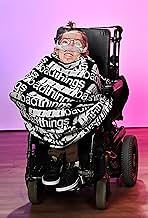Un emprendedor con una discapacidad física prueba a regañadientes una aplicación de citas, lo que lo lleva a un profundo viaje de amor y autodescubrimiento.Un emprendedor con una discapacidad física prueba a regañadientes una aplicación de citas, lo que lo lleva a un profundo viaje de amor y autodescubrimiento.Un emprendedor con una discapacidad física prueba a regañadientes una aplicación de citas, lo que lo lleva a un profundo viaje de amor y autodescubrimiento.
- Dirección
- Escritura
- Estrellas
- Premios
- 2 premios ganados y 2 nominaciones en total
- Dirección
- Escritura
- Todo el elenco y el equipo
- Producción, taquilla y más en IMDbPro
5.8269
1
2
3
4
5
6
7
8
9
10
Opiniones destacadas
Good film overall but...
I learned about this film via Squirmy & Grubs' YouTube channel and I believe that they helped to produce it. I agree that the acting was good and appreciate the message and portrayal of an interabled relationship that was shared. But the main character was too serious for me- he did not really smile or laugh at all in the film and I didn't know if that was just his personality or part of his disability. His disability type was not disclosed in the film. Anyway, he just seemed depressed to me, and maybe he was, but even when he was with his love interest he seemed sad. I still enjoyed the film overall but wanted to see more affect from Danny.
Seeing a person with disabilities act in a film is a big plus though. You often see professional actors without disabilities playing people with disabilities and I have mixed feelings about that. I would rather see people with disabilities acting in the film or show instead. This film could open more doors and make it easier for people with disabilities to get into the film industry. I cannot imagine how hard it must be. Anyway, I couldn't decide whether to give this a 7 or 8. Guess 7.5 if that is an option. Still recommend.
Seeing a person with disabilities act in a film is a big plus though. You often see professional actors without disabilities playing people with disabilities and I have mixed feelings about that. I would rather see people with disabilities acting in the film or show instead. This film could open more doors and make it easier for people with disabilities to get into the film industry. I cannot imagine how hard it must be. Anyway, I couldn't decide whether to give this a 7 or 8. Guess 7.5 if that is an option. Still recommend.
Refreshing view of realistic disability and love
This movie was reccomended to me by Squirmy and Grubs on youtube, an interabled couple who educate people. I really enjoyed watching this, and it was worth the movie price from VEEPS to rent it. This was funny,romantic and overall had a unique and amazing storyline. I love how realistic the main characters love aspect is, with his disability. The movie didnt allow people to pity him or make fun of him, he stood up for himself and it was beautiful and realistic adult realtionship- how it should be. It didnt infantilize him, which some movies do. I appreciate the writing of each scene and how the movie was layed out.
Gorgeous
Shane D. Stanger's Good Bad Things (2024) is a touching and inspiring film about the power of love in all its forms. With an engaging tale, outstanding acting, and stunning photography, this film is a must-see for anybody who believes in the transformational power of love. Simple story follows an app developer falling in love in a gorgeous photographer... but disability of one of the partners always rases doubts... is it real love, or is it something else?
One of the most notable aspects of Good Bad Things is the wonderful chemistry between the principal performers Danny Kurtzman and particularly Jessica Parker Kennedy, who excels as Madi - both subtle and compelling, as she moves through the depths of her character's emotions with grace and honesty. Her acting adds dimension to the film, and it's impossible not to root for her character's path to happiness.
"Love is the best part of life, and all we have to do is take a leap," a sentence told by Dannu's father, resonates throughout every scene of this delightful rom-com drama!
One of the most notable aspects of Good Bad Things is the wonderful chemistry between the principal performers Danny Kurtzman and particularly Jessica Parker Kennedy, who excels as Madi - both subtle and compelling, as she moves through the depths of her character's emotions with grace and honesty. Her acting adds dimension to the film, and it's impossible not to root for her character's path to happiness.
"Love is the best part of life, and all we have to do is take a leap," a sentence told by Dannu's father, resonates throughout every scene of this delightful rom-com drama!
Hope for the future
I just watched good bad things last weekend and I must say that the movie is beautifully acted and beautifully shot and even though there are problems in my opinion with the real portrayal of disability in the film, I would have loved to see more negotiation of the main characters care between the two main characters who were lovers. The emotions were real and raw and hit all in the right places for me I also like the fact that the main character was portrayed as a successful entrepreneur and even though this isn't the reality for most disabled people who live on social assistance of some kind it gives me the hope for the future that one day the world will see us this way.
body image issue
Danny (Danny Kurtzman) has MS and is recovering from a breakup. He and his best friend Jason (Brett Dier) own a small struggling ad company. They need to land the account of dating app company Rubi. Danny reluctantly signs up and gets a surpising match to beautiful photographer Madi (Jessica Parker Kennedy).
First, I'm not sure about their ad company. They don't seem to have any clients. They are working out of this big house. They have a few employees. I guess they could be a struggling ad company for good reasons. I thought they would use his naked pictures for their ad pitch as a closing scene. My other problem is some of the dialogue and monologues. They go on a little too long. They could be tighter and thereby be more impactful. I do like Danny's body image issue. Of course, Danny makes this indie a little different.
First, I'm not sure about their ad company. They don't seem to have any clients. They are working out of this big house. They have a few employees. I guess they could be a struggling ad company for good reasons. I thought they would use his naked pictures for their ad pitch as a closing scene. My other problem is some of the dialogue and monologues. They go on a little too long. They could be tighter and thereby be more impactful. I do like Danny's body image issue. Of course, Danny makes this indie a little different.
¿Sabías que…?
- TriviaIt marks as Gale Hansen's first appearance in a film in more than 30 years.
Selecciones populares
Inicia sesión para calificar y agrega a la lista de videos para obtener recomendaciones personalizadas
- How long is Good Bad Things?Con tecnología de Alexa
Detalles
- Tiempo de ejecución
- 1h 36min(96 min)
- Color
- Relación de aspecto
- 1.90:1
Contribuir a esta página
Sugiere una edición o agrega el contenido que falta


